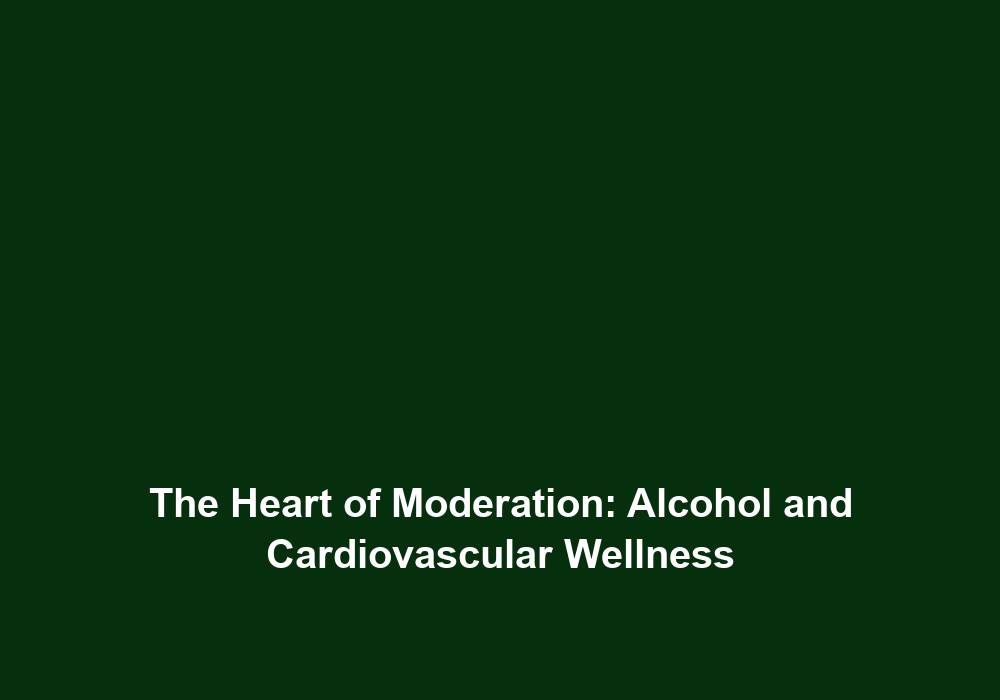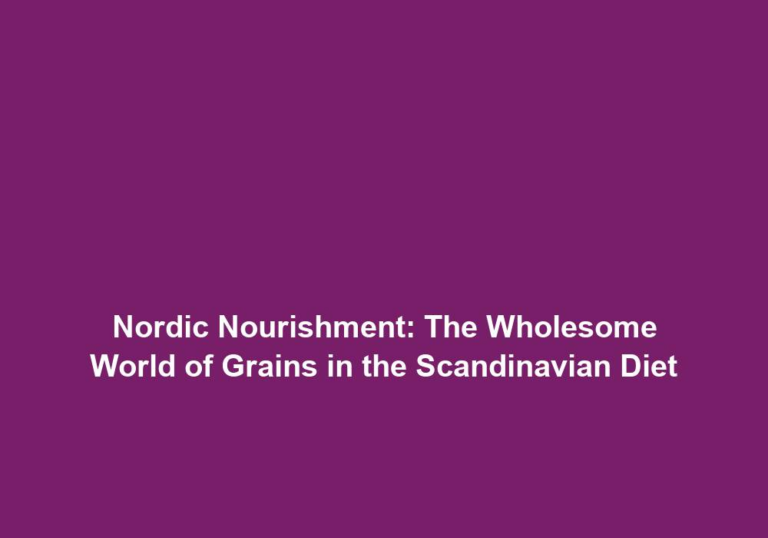The Heart of Moderation: Alcohol and Cardiovascular Wellness
Moderation is the key to maintaining a healthy lifestyle, and this applies not only to our diet and exercise routines, but also to our alcohol consumption. The relationship between alcohol and cardiovascular health has long been a topic of interest, with studies suggesting both positive and negative effects. In this article, we will delve into the heart of moderation and explore the intricate connection between alcohol and cardiovascular wellness.
Understanding Alcohol and Its Effects on the Heart
Alcohol, when consumed in moderation, can have certain cardiovascular benefits. It has been shown to increase the levels of high-density lipoprotein (HDL) cholesterol, commonly known as good cholesterol. HDL cholesterol helps remove low-density lipoprotein (LDL) cholesterol, or bad cholesterol, from the arteries, reducing the risk of heart disease.
Furthermore, moderate alcohol consumption can have a positive impact on blood clotting. It acts as a natural anticoagulant, preventing the formation of blood clots that can block the blood flow to the heart and cause heart attacks or strokes.
However, it is crucial to note that excessive alcohol consumption can have severe detrimental effects on cardiovascular health. Heavy drinking can lead to high blood pressure, irregular heart rhythms, weakened heart muscles, and an increased risk of developing cardiovascular diseases.
The Benefits of Moderate Alcohol Consumption
Moderate alcohol consumption, when adhering to the recommended limits, can provide the following benefits:
-
Increased HDL Cholesterol: Moderate alcohol consumption raises the levels of HDL cholesterol in the blood, which aids in removing LDL cholesterol from the arteries. This process helps maintain healthy blood flow and reduces the risk of heart disease.
-
Anticoagulant Properties: Moderate alcohol consumption acts as a natural anticoagulant, preventing the formation of blood clots that can lead to heart attacks or strokes. This benefit is particularly significant for individuals at risk of clot-related cardiovascular issues.
-
Cardiovascular Disease Prevention: By promoting healthy cholesterol levels and preventing blood clot formation, moderate alcohol consumption can potentially reduce the risk of developing cardiovascular diseases such as coronary artery disease and stroke.
The Risks of Excessive Alcohol Consumption
On the other hand, excessive alcohol consumption can pose significant risks to cardiovascular health. Some of the potential negative effects include:
-
High Blood Pressure: Heavy drinking can lead to high blood pressure, which is a major risk factor for heart disease. It can strain the heart and damage the arteries, increasing the likelihood of heart attacks and strokes.
-
Irregular Heart Rhythms: Excessive alcohol intake can disrupt the normal electrical signals in the heart, leading to irregular heart rhythms or arrhythmias. These irregularities can have serious consequences and may require medical intervention.
-
Weakened Heart Muscles: Prolonged heavy drinking can weaken the heart muscles, reducing the heart’s ability to pump blood effectively. This condition, known as alcoholic cardiomyopathy, can lead to heart failure and other cardiovascular complications.
-
Increased Risk of Cardiovascular Diseases: Heavy drinking is associated with a higher risk of developing various cardiovascular diseases, including alcoholic cardiomyopathy, alcoholic liver disease, and atherosclerosis. These conditions can have severe and potentially life-threatening consequences.
The Fine Line of Moderation
Moderate alcohol consumption is defined as up to one drink per day for women and up to two drinks per day for men. It is crucial to adhere to these guidelines as exceeding the recommended limits can nullify any potential benefits and pose significant health risks.
It is also essential to understand that these guidelines apply to healthy individuals and may vary depending on age, health conditions, and medication use. Consulting with a healthcare professional is always advisable to determine the appropriate level of alcohol consumption based on individual circumstances.
Factors Influencing Moderate Alcohol Consumption
Several factors can influence an individual’s recommended level of moderate alcohol consumption:
-
Age: As individuals age, their bodies may become more sensitive to the effects of alcohol. Older adults may need to consume less alcohol to stay within the boundaries of moderation.
-
Health Conditions: Certain health conditions, such as liver disease, heart disease, and diabetes, may require stricter limits on alcohol consumption or complete abstinence. It is crucial to consider these conditions and consult with a healthcare professional for personalized advice.
-
Medication Use: Some medications can interact negatively with alcohol, leading to adverse effects on the body. It is important to consult with a healthcare professional or pharmacist to understand any potential interactions and adjust alcohol consumption accordingly.
Heart-Healthy Choices: Types of Alcohol
When it comes to alcohol, not all beverages are created equal. Some choices can be more heart-friendly than others. Here is a breakdown of the types of alcohol and their impact on cardiovascular wellness:
-
Red Wine: Red wine, when consumed in moderation, has been associated with several heart-healthy benefits. It contains antioxidants, such as resveratrol, which can protect the heart by reducing inflammation and preventing blood clotting. Additionally, red wine’s alcohol content may contribute to the positive effects on HDL cholesterol levels.
-
White Wine: White wine, like red wine, also contains antioxidants, although in smaller quantities. It can still offer some cardiovascular benefits when consumed in moderation. However, it is important to note that excessive consumption can lead to negative health effects.
-
Beer: Beer, especially those that are darker and richer in flavor, contains certain heart-healthy compounds like soluble fiber and B vitamins. However, it is essential to choose low-alcohol and low-calorie options to maintain a healthy balance. Excessive beer consumption can lead to weight gain and other health issues.
-
Spirits: Spirits, such as vodka, whiskey, or gin, have similar effects on cardiovascular health when consumed in moderation. However, it is crucial to mix them with low-sugar or sugar-free mixers to avoid unnecessary calories and potential adverse effects on heart health. It is also important to note that excessive consumption of spirits can increase the risk of alcohol-related problems.
Additional Considerations for Heart-Healthy Alcohol Consumption
To make heart-healthy choices when consuming alcohol, consider the following:
-
Moderation is Key: Stick to the recommended guidelines for moderate alcohol consumption. Remember that excessive consumption can negate any potential benefits and pose risks to cardiovascular health.
-
Quality Over Quantity: Choose high-quality alcoholic beverages that are crafted with care. Avoid cheap, low-quality options that may contain harmful additives or excessive sugars.
-
Avoid Sugary Mixers: Opt for low-sugar or sugar-free mixers when enjoying spirits. Sugary mixers can contribute unnecessary calories and may have adverse effects on blood sugar levels and heart health.
-
Mindful Drinking: Be aware of your alcohol intake and pace yourself. Avoid binge drinking, as it can have severe health consequences. Spread your drinks over an extended period and prioritize socializing and enjoyment over excessive consumption.
The Importance of Responsible Drinking
While moderate alcohol consumption can offer certain cardiovascular benefits, it is essential to emphasize responsible drinking habits. Here are some key points to keep in mind:
-
Know your limits: Familiarize yourself with the recommended guidelines for moderate alcohol consumption and stick to them. Keep track of your intake and avoid exceeding the limits.
-
Avoid binge drinking: Binge drinking, defined as consuming large quantities of alcohol in a short period, can have severe health consequences. It is essential to pace yourself and spread your drinks over an extended period.
-
Hydrate adequately: Alcohol can dehydrate the body, so it is crucial to counterbalance its effects by drinking plenty of water. Aim to have a glass of water for every alcoholic beverage consumed.
-
Never drink and drive: It goes without saying that driving under the influence is dangerous and poses a significant risk to yourself and others. Always designate a sober driver or use alternative transportation options if you plan to drink.
Conclusion
In conclusion, moderate alcohol consumption can contribute to cardiovascular wellness when approached responsibly. It can increase levels of HDL cholesterol, act as a natural anticoagulant, and potentially reduce the risk of heart disease. However, exceeding the recommended limits or engaging in heavy drinking can have severe adverse effects on heart health. It is crucial to understand the fine line of moderation and make heart-healthy choices when it comes to alcohol consumption. Remember, moderation is the key to maintaining a healthy heart and overall well-being.







